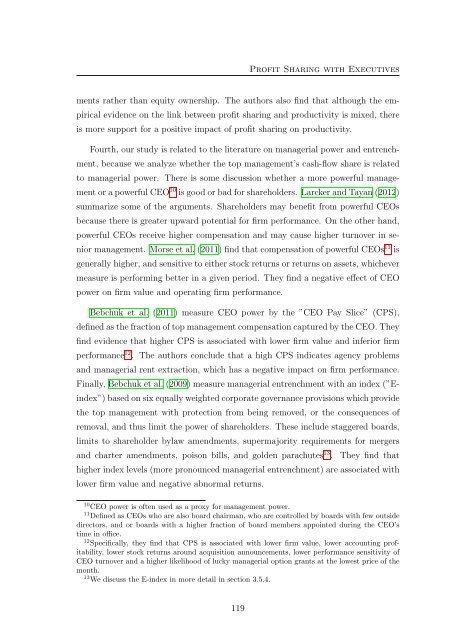Three Essays on Executive Compensation - KOPS - Universität ...
Three Essays on Executive Compensation - KOPS - Universität ...
Three Essays on Executive Compensation - KOPS - Universität ...
You also want an ePaper? Increase the reach of your titles
YUMPU automatically turns print PDFs into web optimized ePapers that Google loves.
Profit Sharing with <strong>Executive</strong>s<br />
ments rather than equity ownership. The authors also find that although the empirical<br />
evidence <strong>on</strong> the link between profit sharing and productivity is mixed, there<br />
is more support for a positive impact of profit sharing <strong>on</strong> productivity.<br />
Fourth, our study is related to the literature <strong>on</strong> managerial power and entrenchment,<br />
because we analyze whether the top management’s cash-flow share is related<br />
to managerial power. There is some discussi<strong>on</strong> whether a more powerful management<br />
or a powerful CEO 10 is good or bad for shareholders. Larcker and Tayan (2012)<br />
summarize some of the arguments. Shareholders may benefit from powerful CEOs<br />
because there is greater upward potential for firm performance. On the other hand,<br />
powerful CEOs receive higher compensati<strong>on</strong> and may cause higher turnover in senior<br />
management. Morse et al. (2011) find that compensati<strong>on</strong> of powerful CEOs 11 is<br />
generally higher, and sensitive to either stock returns or returns <strong>on</strong> assets, whichever<br />
measure is performing better in a given period. They find a negative effect of CEO<br />
power <strong>on</strong> firm value and operating firm performance.<br />
Bebchuk et al. (2011) measure CEO power by the ”CEO Pay Slice” (CPS),<br />
defined as the fracti<strong>on</strong> of top management compensati<strong>on</strong> captured by the CEO. They<br />
find evidence that higher CPS is associated with lower firm value and inferior firm<br />
performance 12 . The authors c<strong>on</strong>clude that a high CPS indicates agency problems<br />
and managerial rent extracti<strong>on</strong>, which has a negative impact <strong>on</strong> firm performance.<br />
Finally, Bebchuk et al. (2009) measure managerial entrenchment with an index (”Eindex”)<br />
based <strong>on</strong> six equally weighted corporate governance provisi<strong>on</strong>s which provide<br />
the top management with protecti<strong>on</strong> from being removed, or the c<strong>on</strong>sequences of<br />
removal, and thus limit the power of shareholders. These include staggered boards,<br />
limits to shareholder bylaw amendments, supermajority requirements for mergers<br />
and charter amendments, pois<strong>on</strong> bills, and golden parachutes 13 . They find that<br />
higher index levels (more pr<strong>on</strong>ounced managerial entrenchment) are associated with<br />
lower firm value and negative abnormal returns.<br />
10 CEO power is often used as a proxy for management power.<br />
11 Defined as CEOs who are also board chairman, who are c<strong>on</strong>trolled by boards with few outside<br />
directors, and or boards with a higher fracti<strong>on</strong> of board members appointed during the CEO’s<br />
time in office.<br />
12 Specifically, they find that CPS is associated with lower firm value, lower accounting profitability,<br />
lower stock returns around acquisiti<strong>on</strong> announcements, lower performance sensitivity of<br />
CEO turnover and a higher likelihood of lucky managerial opti<strong>on</strong> grants at the lowest price of the<br />
m<strong>on</strong>th.<br />
13 We discuss the E-index in more detail in secti<strong>on</strong> 3.5.4.<br />
119
















